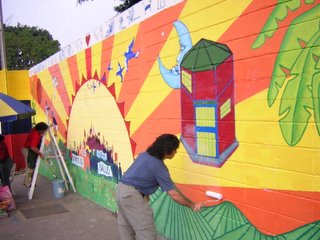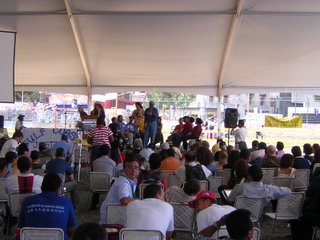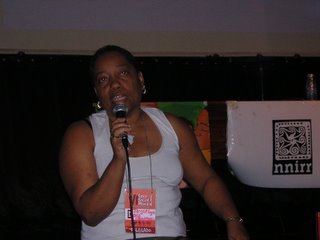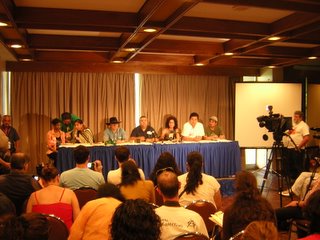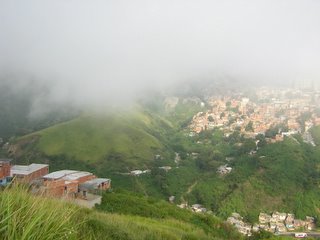Monday, January 30, 2006
Wednesday, January 25, 2006
Logistical Nightmares at the 6th WSF
by Colin Rajah reporting from Caracas, Venezuela
The logistics were a nightmare. The main highway from the airport runs across a bridge that collapsed significantly a week ago. Timing could not be worse (and rumors of sabotage are rampant), as over 100,000 people from around the Americas converge into Caracas for the World Social Forum this week.
Most of our Grassroots Global Justice (GGJ) delegation made it in safe and sound however, in spite of 6-hour waits at the airport, 3-hour bus rides through windy mountain roads, and navigating massive traffic jams in the city to get to our hotel and orientation. And when we did, it was a coming home of sorts - connections and relationships among a vastly immigrant, people-of-color, grassroots delegation tug at not just the political, but our emotional bonds.
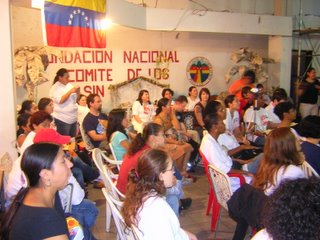 As other logistical "challenges" faced our orientation and meeting with a local host organization, we endured that with patience and tenacity. We formed out workgroups to embark on our mission this week - to make international/hemispheric grassroots connections with other communities in the Global South, and to challenge the stereotypes about U.S. society and communities.
As other logistical "challenges" faced our orientation and meeting with a local host organization, we endured that with patience and tenacity. We formed out workgroups to embark on our mission this week - to make international/hemispheric grassroots connections with other communities in the Global South, and to challenge the stereotypes about U.S. society and communities.
Most importantly for us, presenting a broader, more diverse representation of immigrant communities in the U.S. who have to endure forced displacements in their home countries, and then oppressive political and economic forces in the U.S., is vital.
 But we confidently forged ahead, especially in the opening march. NNIRR board member Susan Alva, alongside NNIRR members from CAAAV, CHIRLA and the Florida Farmworkers Association, carried the NNIRR banner high as we joined in our larger delegation´s chant "...Justice for the Whole World!...Que Viva!"
But we confidently forged ahead, especially in the opening march. NNIRR board member Susan Alva, alongside NNIRR members from CAAAV, CHIRLA and the Florida Farmworkers Association, carried the NNIRR banner high as we joined in our larger delegation´s chant "...Justice for the Whole World!...Que Viva!"
So the 6th WSF week has begun, in spite of the challenges. And as we look forward to this week, we know we´ll face even more challenges, logistical and otherwise. In the wake of a Congressional bill that proposes to build a wall on the US-Mexico border and seeks to essentially separate the U.S. from all of Latin America, the concept of a united Americas seems remote and distant. But for people who build communities across these borders, we have something to say about it, and we will.
The logistics were a nightmare. The main highway from the airport runs across a bridge that collapsed significantly a week ago. Timing could not be worse (and rumors of sabotage are rampant), as over 100,000 people from around the Americas converge into Caracas for the World Social Forum this week.
Most of our Grassroots Global Justice (GGJ) delegation made it in safe and sound however, in spite of 6-hour waits at the airport, 3-hour bus rides through windy mountain roads, and navigating massive traffic jams in the city to get to our hotel and orientation. And when we did, it was a coming home of sorts - connections and relationships among a vastly immigrant, people-of-color, grassroots delegation tug at not just the political, but our emotional bonds.
 As other logistical "challenges" faced our orientation and meeting with a local host organization, we endured that with patience and tenacity. We formed out workgroups to embark on our mission this week - to make international/hemispheric grassroots connections with other communities in the Global South, and to challenge the stereotypes about U.S. society and communities.
As other logistical "challenges" faced our orientation and meeting with a local host organization, we endured that with patience and tenacity. We formed out workgroups to embark on our mission this week - to make international/hemispheric grassroots connections with other communities in the Global South, and to challenge the stereotypes about U.S. society and communities.Most importantly for us, presenting a broader, more diverse representation of immigrant communities in the U.S. who have to endure forced displacements in their home countries, and then oppressive political and economic forces in the U.S., is vital.
 But we confidently forged ahead, especially in the opening march. NNIRR board member Susan Alva, alongside NNIRR members from CAAAV, CHIRLA and the Florida Farmworkers Association, carried the NNIRR banner high as we joined in our larger delegation´s chant "...Justice for the Whole World!...Que Viva!"
But we confidently forged ahead, especially in the opening march. NNIRR board member Susan Alva, alongside NNIRR members from CAAAV, CHIRLA and the Florida Farmworkers Association, carried the NNIRR banner high as we joined in our larger delegation´s chant "...Justice for the Whole World!...Que Viva!"So the 6th WSF week has begun, in spite of the challenges. And as we look forward to this week, we know we´ll face even more challenges, logistical and otherwise. In the wake of a Congressional bill that proposes to build a wall on the US-Mexico border and seeks to essentially separate the U.S. from all of Latin America, the concept of a united Americas seems remote and distant. But for people who build communities across these borders, we have something to say about it, and we will.
Saturday, January 21, 2006
NNIRR at the WSF in Caracas
by Colin Rajah
The National Network for Immigrant and Refugee Rights (NNIRR) and a number of its members (CAAAV - Organizing Asian Communities, Committee for Humane Immigrant Rights in Los Angels - CHIRLA, Domestic Workers United - DWU, Farmworkers Association of Florida, Filipinos for Affirmative Action - FAA, Mujeres Unidas y Activas - MUA etc.) will be among the 120+ person grassroots US delegation of Grassroots Global Justice (GGJ) at the polycentric World Social Forum (WSF) in Caracas, Venezuela from January 24th through the 30th.
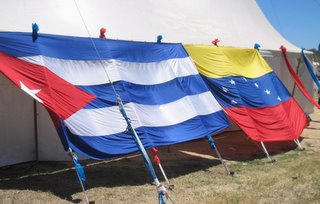 Among various activities, NNIRR will be organizing a workshop on "Globalization & Migrant Rights: Migrant Testimonies Challenging Neoliberal Economic Policies". The workshop details are as follows:
Among various activities, NNIRR will be organizing a workshop on "Globalization & Migrant Rights: Migrant Testimonies Challenging Neoliberal Economic Policies". The workshop details are as follows:
Date: Friday, Jan 27th
Time: 8:30-11:30am
Place: Sala 01 (Teatro), CELARG Altamira, Ave. Luis Roche
We invite all NNIRR allies and partners who will be Caracas for the WSF, to join us in our many activities, especially this critical workshop which seeks to expose the impact globalization has had on migration and migrant rights, and find ways to build a migrant rights movement around it.
Colin Rajah (NNIRR's International Program Coordinator) and Susan Alva (NNIRR's board member) will be coordinating NNIRR's caucus and presence at the WSF. They can be reached at:
Hotel Conde, Esquina el Conde, Caracas
+58-212-811-1171
crajah@nnirr.org
Please watch this space for updates directly from Caracas in the next few days...
The National Network for Immigrant and Refugee Rights (NNIRR) and a number of its members (CAAAV - Organizing Asian Communities, Committee for Humane Immigrant Rights in Los Angels - CHIRLA, Domestic Workers United - DWU, Farmworkers Association of Florida, Filipinos for Affirmative Action - FAA, Mujeres Unidas y Activas - MUA etc.) will be among the 120+ person grassroots US delegation of Grassroots Global Justice (GGJ) at the polycentric World Social Forum (WSF) in Caracas, Venezuela from January 24th through the 30th.
 Among various activities, NNIRR will be organizing a workshop on "Globalization & Migrant Rights: Migrant Testimonies Challenging Neoliberal Economic Policies". The workshop details are as follows:
Among various activities, NNIRR will be organizing a workshop on "Globalization & Migrant Rights: Migrant Testimonies Challenging Neoliberal Economic Policies". The workshop details are as follows:Date: Friday, Jan 27th
Time: 8:30-11:30am
Place: Sala 01 (Teatro), CELARG Altamira, Ave. Luis Roche
We invite all NNIRR allies and partners who will be Caracas for the WSF, to join us in our many activities, especially this critical workshop which seeks to expose the impact globalization has had on migration and migrant rights, and find ways to build a migrant rights movement around it.
Colin Rajah (NNIRR's International Program Coordinator) and Susan Alva (NNIRR's board member) will be coordinating NNIRR's caucus and presence at the WSF. They can be reached at:
Hotel Conde, Esquina el Conde, Caracas
+58-212-811-1171
crajah@nnirr.org
Please watch this space for updates directly from Caracas in the next few days...
Subscribe to:
Comments (Atom)
